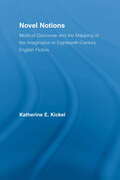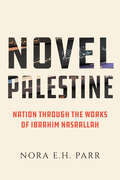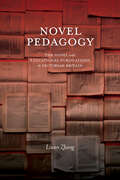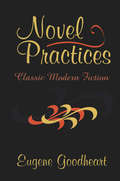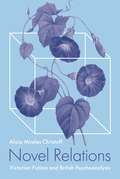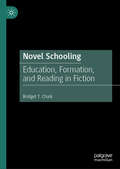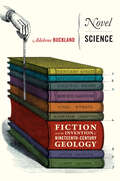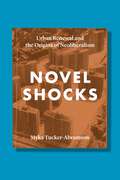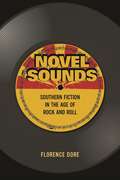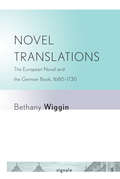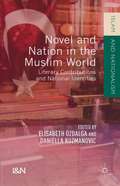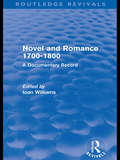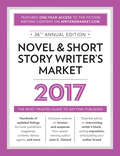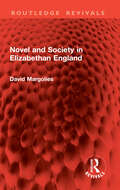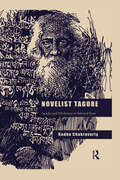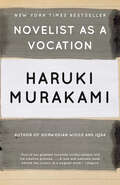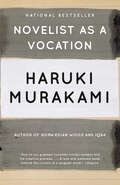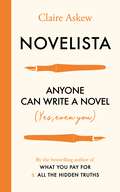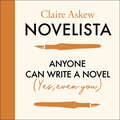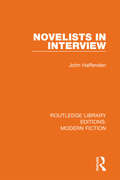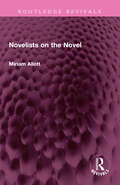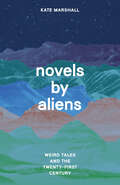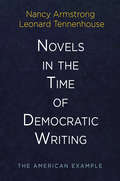- Table View
- List View
Novel Notions: Medical Discourse and the Mapping of the Imagination in Eighteenth-Century English Fiction (Literary Criticism And Cultural Theory Ser.)
by Katherine E. KickelMedical, popular, and literary understanding about the imagination converged when Thomas Willis asserted that he had discovered the area of the brain that facilitated imagining. Taking this 'discovery' as paradigmatic, Novel Notions examines the reverberations of the medical investigation of the imagination in early British novels by Daniel Defoe, Henry Fielding, Laurence Sterne, and Ann Radcliffe. It argues that one of the novel's central features was a mapping of the terrain of human cognition, imagination, and creation, as a continuation of early modern medicine's account of perceptual experience. All the novels discussed reveal a simultaneous anxiety and excitement about medicine's understanding of the relationship between the imagination and perceptual experience through narrators who reflect on the nature of authoring.
Novel Palestine: Nation through the Works of Ibrahim Nasrallah (New Directions in Palestinian Studies #7)
by Dr. Nora E.H. ParrA free ebook version of this title is available through Luminos, University of California Press's Open Access publishing program. Visit www.luminosoa.org to learn more. Palestinian writing imagines the nation, not as a nation-in-waiting but as a living, changing structure that joins people, place, and time into a distinct set of formations. Novel Palestine examines these imaginative structures so that we might move beyond the idea of an incomplete or fragmented reality and speak frankly about the nation that exists and the freedom it seeks. Engaging the writings of Ibrahim Nasrallah, Nora E. H. Parr traces a vocabulary through which Palestine can be discussed as a changing and flexible national network linking people across and within space, time, and community. Through an exploration of the Palestinian literary scene subsequent to its canonical writers, Parr makes the life and work of Nasrallah available to an English-language audience for the first time, offering an intervention in geography while bringing literary theory into conversation with politics and history.
Novel Pedagogy: The Novel and Educational Publications in Victorian Britain (SUNY series, Studies in the Long Nineteenth Century)
by Liwen ZhangIs the novel a category of knowledge that merits serious study? Even if the novel has shed the stigma of being mindless entertainment, one might easily assume that reading a novel is not "studying," unless one reads closely and carefully, preferably from a scholarly edition or for a scholarly purpose. Novel Pedagogy explores how Victorian writers envisioned the novel's potential to become knowledge long before the form’s ascendence into the ivory tower. Liwen Zhang argues that Victorian novelists' constant critique of schooling, on the one hand, and their frequent invocation of deep knowledge, on the other, are not self-contradictory. Instead of offering a blissful escape from education, writers such as William Thackeray, Charles Kingsley, Charles Dickens, Elizabeth Gaskell, George Eliot, and George Gissing seek to offer uniquely novelistic pathways to knowledge. Novel Pedagogy offers a new model of novelistic epistemology by showing how the novel, unlike other educational genres, reflects on the unpleasant realities of learning—and of not learning—amid the ubiquity of ineffective textbooks, reluctant students, and false motivations.
Novel Practices: Classic Modern Fiction
by Eugene GoodheartAn important debate in modern literary criticism concerns the exact relationship between the ancient epic and the novel. Both the epic and the most ambitious modern novels are large-scale attempts to present a comprehensive view of the world through the experience of a representative hero. However, in the older tradition the hero stood for the aspirations and highest ideals of his society. The protagonist of the modern novel is usually at odds with that society, whether as exile, active rebel, or antagonistic critic. In Novel Practices, the distinguished literary scholar Eugene Goodheart surveys a representative selection of modern novelists tracing how the epic impulse has been reshaped under the conditions of modernity.
Novel Relations: Victorian Fiction and British Psychoanalysis
by Professor Alicia Mireles ChristoffNovel Relations engages twentieth-century post-Freudian British psychoanalysis in an unprecedented way: as literary theory. Placing the writing of figures like D. W. Winnicott, W. R. Bion, Michael and Enid Balint, Joan Riviere, Paula Heimann, and Betty Joseph in conversation with canonical Victorian fiction, Alicia Christoff reveals just how much object relations can teach us about how and why we read. These thinkers illustrate the ever-shifting impact our relations with others have on the psyche, and help us see how literary figures—characters, narrators, authors, and other readers—shape and structure us too. For Christoff, novels are charged relational fields.Closely reading novels by George Eliot and Thomas Hardy, Christoff shows that traditional understandings of Victorian fiction change when we fully recognize the object relations of reading. It is not by chance that British psychoanalysis illuminates underappreciated aspects of Victorian fiction so vibrantly: Victorian novels shaped modern psychoanalytic theories of psyche and relationality—including the eclipsing of empire and race in the construction of subject. Relational reading opens up both Victorian fiction and psychoanalysis to wider political and postcolonial dimensions, while prompting a closer engagement with work in such areas as critical race theory and gender and sexuality studies.The first book to examine at length the connections between British psychoanalysis and Victorian fiction, Novel Relations describes the impact of literary form on readers and on twentieth- and twenty-first-century theories of the subject.
Novel Schooling: Education, Formation, and Reading in Fiction
by Bridget T. ChalkThis book identifies and explores the consistent link between negative depictions of education in novels and claims for the educative effects of reading them. The novel and education are both phenomena that rely fundamentally on development over time: the former in plot and character, and the latter in individual potential. Despite this basic parallel, these forms of development are at odds in many works of fiction that treat education as constrictive and even traumatic to the individual, rather than healthy and formative. Novel Schooling identifies a pervasive pattern in novels from the 19th to 21st centuries: writers ranging from Charles Dickens and D.H. Lawrence to Zadie Smith reject conventional modes of education and propose their own models for shaping the sensibilities of their characters and readers. These works critique institutional education as a point of departure to position reading fiction as a superior form of individual development. Using the new ethics and reader-response theory, this work traces the treatment of education in and through the novel, concluding with fresh assertions of the value of literature in a digital, market-driven world.
Novel Science: Fiction and the Invention of Nineteenth-Century Geology
by Adelene BucklandNovel Science is the first in-depth study of the shocking, groundbreaking, and sometimes beautiful writings of the gentlemen of the “heroic age” of geology and of the contribution these men made to the literary culture of their day. For these men, literature was an essential part of the practice of science itself, as important to their efforts as mapmaking, fieldwork, and observation. The reading and writing of imaginative literatures helped them to discover, imagine, debate, and give shape and meaning to millions of years of previously undiscovered earth history. Borrowing from the historical fictions of Walter Scott and the poetry of Lord Byron, they invented geology as a science, discovered many of the creatures we now call the dinosaurs, and were the first to unravel and map the sequence and structure of stratified rock. As Adelene Buckland shows, they did this by rejecting the grand narratives of older theories of the earth or of biblical cosmogony: theirs would be a humble science, faithfully recording minute details and leaving the big picture for future generations to paint. Buckland also reveals how these scientists—just as they had drawn inspiration from their literary predecessors—gave Victorian realist novelists such as George Eliot, Charles Kingsley, and Charles Dickens a powerful language with which to create dark and disturbing ruptures in the too-seductive sweep of story.
Novel Shocks: Urban Renewal and the Origins of Neoliberalism
by Myka Tucker-AbramsonThroughout the 1950s, a coalition of developers, politicians, and planners bulldozed vast areas of land deemed “slums” or “blighted” to make way for freeways, public and private housing projects, cultural centers, and skyscrapers. While the program was national, New York was ground zero, and the demolition and monumental reconstruction of the city created a distinctive urban sensorium, rooted in the new segregated landscapes of prosperous white private space and poor black public space.Novel Shocks situates these landscapes at the center of the midcentury novel, arguing that James Baldwin, Ralph Ellison, Patricia Highsmith, Ayn Rand, William Burroughs, Sylvia Plath, and Warren Miller all registered these new urban spaces as traumatic “shocks” that required new aesthetic forms. Rejecting older shock-based modernisms, these novelists forged a new modernism, which reimagined shock as a therapeutic force that would create a more flexible, self-reliant, and resilient subject that would nourish neoliberalism’s roots. In offering a cultural prehistory of neoliberalism, Novel Shocks resituates the Cold War novel as a key archive for understanding neoliberalism’s emergence and offers a more materialist and historically grounded account of neoliberalism’s subjective, affective, and ideological structures.
Novel Sounds: Southern Fiction in the Age of Rock and Roll
by Florence DoreThe 1950s witnessed both the birth of both rock and roll and the creation of Southern literature as we know it. Around the time that Chuck Berry and Elvis Presley put their electric spin on Southern vernacular ballads, a canonical group of white American authors native to rock’s birthplace began to write fiction about the electrification of those ballads, translating into literary form key cultural changes that gave rise to the infectious music coming out of their region. In Novel Sounds, Florence Dore tells the story of how these forms of expression became intertwined and shows how Southern writers turned to rock music and its technologies—tape, radio, vinyl—to develop the “rock novel.” Dore considers the work of Southern writers like William Faulkner, Flannery O’Connor, and William Styron alongside the music of Bessie Smith, Lead Belly, and Bob Dylan to uncover deep historical links between rock and Southern literature. Along with rock pioneers, Southern authors drew from blues, country, jazz, and other forms to create a new brand of realism that redefined the Southern vernacular as global, electric, and notably white. Resurrecting this Southern literary tradition at the birth of rock, Dore clarifies the surprising but unmistakable influence of rock and roll on the American novel. Along the way, she explains how literature came to resemble rock and roll, an anti-institutional art form if there ever was one, at the very moment academics claimed literature for the institution.
Novel Translations: The European Novel and the German Book, 1680–1730 (Signale: Modern German Letters, Cultures, and Thought)
by Bethany WigginMany early novels were cosmopolitan books, read from London to Leipzig and beyond, available in nearly simultaneous translations into French, English, German, and other European languages. In Novel Translations, Bethany Wiggin charts just one of the paths by which newness—in its avatars as fashion, novelties, and the novel—entered the European world in the decades around 1700. As readers across Europe snapped up novels, they domesticated the genre. Across borders, the novel lent readers everywhere a suggestion of sophistication, a familiarity with circumstances beyond their local ken. Into the eighteenth century, the modern German novel was not German at all; rather, it was French, as suggested by Germans' usage of the French word Roman to describe a wide variety of genres: pastoral romances, war and travel chronicles, heroic narratives, and courtly fictions. Carried in large part on the coattails of the Huguenot diaspora, these romans, nouvelles, amours secrets, histoires galantes, and histories scandaleuses shaped German literary culture to a previously unrecognized extent. Wiggin contends that this French chapter in the German novel's history began to draw to a close only in the 1720s, more than sixty years after the word first migrated into German. Only gradually did the Roman go native; it remained laden with the baggage from its "French" origins even into the nineteenth century.
Novel and Nation in the Muslim World
by Daniella Kuzmanovic Elisabeth �zdalgaThis book explores the relationship between fictional literature and nation formation in the wider Muslim world. Through twelve unique case studies, it shows how the complex entanglements of nation, religion, and modernity in the process of political and cultural identity formation are probed and verbalized in fiction. The collection of studies in the book is unique. The chapters move beyond well-researched Arab-Muslim core settings such as Egypt, Lebanon, Syria, and Palestine, and focus onother Arabic and non-Arabic Muslim majority countries, including Yemen, Saudi Arabia, Libya, Azerbaijan, Iraq, and Iran. The contributions link these literary narratives to the formation of national identities in culturally and linguistically diverse - even antagonistic - settings. The book is excellent reading for advanced undergraduate and graduate students in Middle Eastern studies, cultural studies, comparative literature, postcolonial studies, anthropology, and sociology, as well as thoseinterested in Muslim societies, and nationalism.
Novel and Romance 1700-1800: A Documentary Record (Routledge Revivals)
by Ioan WilliamsThe documents collected in this volume, first published in 1970, trace the development of novel criticism during one of the most formative periods in the history of fiction: from 1700-1800. The material includes prefaces to collections, translations and original novels; essays written for journals modelled on the Spectator; passages taken from miscellanies and from books written primarily for some purpose unconnected with the novel; reviews from the monthly reviews; and introductions to the collected works of certain authors. This volume covers 100 years of criticism and creative writing, and the materials are arranged chronologically. Each of the documents is headed by an Introductory Note and the Editor has provided an important historical introduction.
Novel and Short Story Writer’s Market 2017: The Most Trusted Guide to Getting Published (Market #2017)
by Rachel Randall36th Annual Edition
Novel and Society in Elizabethan England (Routledge Revivals)
by David MargoliesThe Elizabethans witnessed not only a great flowering of drama, but also a flourishing of fiction and the development of a literary entertainment business. Printing made possible a wide distribution of cheap books that found an audience in all sections of society. The large, new literary market enabled the presentation of different social viewpoints and encouraged an alternative to ‘official’ ideology. First published in 1985, Novel and Society in Elizabethan England presents a whole range of English fiction of the period against its social background. It considers the major authors of prose fiction—John Lyly, Philip Sidney, Thomas Nashe, Robert Greene, and Thomas Deloney—and examines how they organised their works for audiences with a specific social perspective.In taking a functional view of literature, treating the novels not as static literary artefacts but in terms of their social role, Margolies redefines the idea of literary value. He offers a new, coherent view of the major figures of the Elizabethan novel, which should challenge the thinking of students of the novel and the age of Shakespeare.
Novelist Tagore: Gender and Modernity in Selected Texts
by Radha ChakravartyRabindranath Tagore is widely regarded as a poet-philosopher and educationist, but his novels remain a relatively underexplored aspect of his oeuvre. Focusing on gender and modernity as key features of his fiction, this book charts Tagore's evolution as a novelist from self-conscious psychologizing in Chokher Bali to an engagement with nationalism in Gora and Ghare Baire (The Home and the World); a portrayal of asceticism and desire in Chaturanga (Quartet); an analysis of marriage, sexuality and change in Bengali society in Yogayog (Relationships); an effervescent fusion of social satire and literary experimentation in Shesher Kabita (Farewell Song); and an intense, dramatic study of love, politics and terrorism in Char Adhyay (Four Chapters). This study demonstrates that Tagore’s writings cannot be readily assimilated within current theoretical frameworks, and urges us to rethink the conventional oppositions between tradition and modernity, masculinity and femininity, East and West, and local and global. Addressing a major gap in the field, the book reconstructs Tagore as a novelist of eminent stature, demonstrates the range and complexity of his creative genius, his contribution to literary history and the relevance of his reflections to our times. Enriched by insights into the biographical and socio-historical contexts of his novels, this book will be of special interest to researchers, teachers and students of comparative and world literature, history, postcolonial studies and gender studies, as also to Tagore enthusiasts.
Novelist as a Vocation
by Haruki MurakamiA charmingly idiosyncratic look at writing, creativity and the author's own novels.Haruki Murakami's myriad fans will be delighted by this unique look into the mind of a master storyteller. In this engaging book, the internationally bestselling author and famously reclusive writer shares with readers what he thinks about being a novelist; his thoughts on the role of the novel in our society; his own origins as a writer; and his musings on the sparks of creativity that inspire other writers, artists, and musicians. Readers who have long wondered where the mysterious novelist gets his ideas and what inspires his strangely surreal worlds will be fascinated by this highly personal look at the craft of writing.
Novelist as a Vocation
by Haruki MurakamiNEW YORK TIMES BEST SELLER • An insightful look into the mind of a master storyteller—and a unique look at the craft of writing from the beloved and best-selling author of 1Q84, Norwegian Wood, and What I Talk About When I Talk About Running. "Murakami is like a magician who explains what he's doing as he performs the trick and still makes you believe he has supernatural powers" —New York Times Book ReviewA MOST ANTICIPATED BOOK: Esquire, Vulture, LitHub, New York ObserverAspiring writers and readers who have long wondered where the mysterious novelist gets his ideas and what inspires his strangely surreal worlds will be fascinated by this engaging book from the internationally best-selling author. Haruki Murakami now shares with readers his thoughts on the role of the novel in our society; his own origins as a writer; and his musings on the sparks of creativity that inspire other writers, artists, and musicians.Here are the personal details of a life devoted to craft: the initial moment at a Yakult Swallows baseball game, when he suddenly knew he could write a novel; the importance of memory, what he calls a writer&’s &“mental chest of drawers&”; the necessity of loneliness, patience, and his daily running routine; the seminal role a carrier pigeon played in his career and more. "What I want to say is that in a certain sense, while the novelist is creating a novel, he is simultaneously being created by the novel as well." —Haruki Murakami
Novelista: Anyone can write a novel. Yes, even you.
by Claire AskewNOVELISTA is a friendly, straight-talking writing guide for people who want to write a novel but don't know how to begin. It asks all the important questions and gives a host of reassuring answers that demonstrate that anyone can write a novel - even you!To begin with, what the hell is a novel? It's basically a tiny world, where characters are born, live, and (sometimes) die. To write one all you need is a notebook and a pen - but along the way you'll want to learn about good writing habits, planning, mastering descriptions and dialogue and how to pull it all together. This book will guide you through the process and orient you towards the goal of publication.From absolute beginner to novelista, this book will change the way you write and think about writing.
Novelista: Anyone can write a novel. Yes, even you.
by Claire AskewNOVELISTA is a friendly, straight-talking writing guide for people who want to write a novel but don't know how to begin. It asks all the important questions and gives a host of reassuring answers that demonstrate that anyone can write a novel - even you!To begin with, what the hell is a novel? It's basically a tiny world, where characters are born, live, and (sometimes) die. To write one all you need is a notebook and a pen - but along the way you'll want to learn about good writing habits, planning, mastering descriptions and dialogue and how to pull it all together. This book will guide you through the process and orient you towards the goal of publication.From absolute beginner to novelista, this book will change the way you write and think about writing.
Novelista: Anyone can write a novel. Yes, even you.
by Claire AskewNOVELISTA is a friendly, straight-talking writing guide for people who want to write a novel but don't know how to begin. It asks all the important questions and gives a host of reassuring answers that demonstrate that anyone can write a novel - even you!To begin with, what the hell is a novel? It's basically a tiny world, where characters are born, live, and (sometimes) die. To write one all you need is a notebook and a pen - but along the way you'll want to learn about good writing habits, planning, mastering descriptions and dialogue and how to pull it all together. This book will guide you through the process and orient you towards the goal of publication.From absolute beginner to novelista, this book will change the way you write and think about writing.(P) 2020 Hodder & Stoughton Ltd
Novelists in Interview (Routledge Library Editions: Modern Fiction #17)
by John HaffendenOriginally published in 1985, fourteen foremost writers of fiction give detailed accounts of their writings in this absorbing collection by John Haffenden, whom The Sunday Times has applauded for having ‘perfected’ the art of the literary interview. Bringing together discussions with a wide range of authors in Britain at the time, the volume contains interviews with Martin Amis, Malcolm Bradbury, Anita Brookner, Angela Carter, William Golding, Russell Hoban, David Lodge, Ian McEwan, Iris Murdoch, V.S. Pritchett, Salman Rushdie, David Storey, Emma Tennant and Fay Weldon. John Haffenden questions them about the creative process, about specific works – including Golding’s Rites of Passage, Hoban’s Riddley Walker, Murdoch’s The Philosopher’s Pupil and Rushdie’s Midnight’s Children and Shame – and about the ideas and visions which inform those works. The writers provide lively, fascinating and often definitive responses which offer many insights into the value and function of fiction. The volume also includes discussions of cultural context and of narrative techniques and kinds – realist, postmodernist, fabulous – offering immediate material for critical debate. For all who are interested in twentieth century fiction it is essential reading.
Novelists on the Novel (Routledge Revivals)
by Miriam AllottFirst published in 1959, Novelists on the Novel makes an attempt to set out fully what novelists both major and minor have to say about the practice of their art. It draws on the experience of English, French and Russian novelists so that the general reader and the more serious literature student can find out what they have to say about the novel as a literary form. The included passages come from novels themselves, from diaries, letters, notebooks, etc., and together constitute something like an aesthetic of the novel. Using these sources, the book tries to answer the following questions: What is a novel? what are the problems which face the novelist when he sits down to write a work of fiction? How is he to tell his story? What exactly is meant by the ‘point of view’? How should he manipulate time? How is he, in one of the possible senses of the word, to make his characters seem ‘real’? What are the functions of dialogue and how should it be dovetailed into narrative?
Novels by Aliens: Weird Tales and the Twenty-First Century
by Kate MarshallA wide-ranging account of the twenty-first century’s fascination with the weird. Twenty-first-century fiction and theory have taken a decidedly weird turn. They both show a marked interest in the nonhuman and in the preternatural moods that the nonhuman often evokes. Writers of fiction and criticism are avidly experimenting with strange, even alien perspectives and protagonists. Kate Marshall’s Novels by Aliens explores this development broadly while focusing on problems of genre fiction. She identifies three key generic hybrids that harness a longing for the nonhuman: the old weird, an alternative tradition within naturalism and modernism for the twenty-first century’s cowboys and aliens; cosmic realism, the reach for words legible only from space in otherwise terrestrial narratives; and pseudoscience fiction, which imagines speculative futures beyond human life on earth. Offering sharp and surprising insights about a breathtaking range of authors, from Edgar Rice Burroughs to Kazuo Ishiguro, Willa Cather to Maggie Nelson, Novels by Aliens tells the story of how genre became mood in the twenty-first century.
Novels by Aliens: Weird Tales and the Twenty-First Century
by Kate MarshallA wide-ranging account of the twenty-first century’s fascination with the weird. Twenty-first-century fiction and theory have taken a decidedly weird turn. They both show a marked interest in the nonhuman and in the preternatural moods that the nonhuman often evokes. Writers of fiction and criticism are avidly experimenting with strange, even alien perspectives and protagonists. Kate Marshall’s Novels by Aliens explores this development broadly while focusing on problems of genre fiction. She identifies three key generic hybrids that harness a longing for the nonhuman: the old weird, an alternative tradition within naturalism and modernism for the twenty-first century’s cowboys and aliens; cosmic realism, the reach for words legible only from space in otherwise terrestrial narratives; and pseudoscience fiction, which imagines speculative futures beyond human life on earth. Offering sharp and surprising insights about a breathtaking range of authors, from Edgar Rice Burroughs to Kazuo Ishiguro, Willa Cather to Maggie Nelson, Novels by Aliens tells the story of how genre became mood in the twenty-first century.
Novels in the Time of Democratic Writing: The American Example
by Nancy Armstrong Leonard TennenhouseDuring the thirty years following ratification of the U.S. Constitution, the first American novelists carried on an argument with their British counterparts that pitted direct democracy against representative liberalism. Such writers as Hannah Foster, Isaac Mitchell, Royall Tyler, Leonore Sansay, and Charles Brockden Brown developed a set of formal tropes that countered, move for move, those gestures and conventions by which Samuel Richardson, Jane Austen, and others created their closed worlds of self, private property, and respectable society. The result was a distinctively American novel that generated a system of social relations resembling today's distributed network. Such a network operated counter to the formal protocols that later distinguished the great tradition of the American novel.In Novels in the Time of Democratic Writing, Nancy Armstrong and Leonard Tennenhouse show how these first U.S. novels developed multiple paths to connect an extremely diverse field of characters, redefining private property as fundamentally antisocial and setting their protagonists to the task of dispersing that property—its goods and people—throughout the field of characters. The populations so reorganized proved suddenly capable of thinking and acting as one. Despite the diverse local character of their subject matter and community of readers, the first U.S. novels delivered this argument in a vernacular style open and available to all. Although it differed markedly from the style we attribute to literary authors, Armstrong and Tennenhouse argue, such democratic writing lives on in the novels of Cooper, Hawthorne, Melville, and James.
